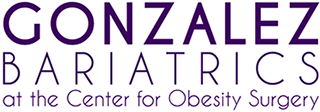Gastric Bypass
Gastric Bypass accounts for a large percentage of weight loss surgeries performed in the United States today. While many patients prefer less-invasive procedures like Gastric Sleeve, Gastric Bypass remains extremely popular because it offers the single greatest opportunity for rapid weight loss of any bariatric procedure.
The Society of American Gastrointestinal and Endoscopic Surgeons (SAGES) calls Gastric Bypass the “the gold standard of bariatric procedures” and also notes the low complication rates. As with other weight loss surgeries, a long-term commitment to healthy living, including maintaining a proper diet and getting sufficient exercise, can greatly impact an individual’s long-term weight loss and overall health.
Major advantages of Gastric Bypass
Quick weight loss—What patients love most about the Gastric Bypass procedure is the quick weight loss. Most of the excess weight comes off within a year or even nine months.
Can save lives—Those who are significantly overweight may also be at risk for heart attack, stroke, and other dangerous and potentially deadly conditions. Gastric Bypass can, quite literally, be a lifesaver. The quick, substantial weight loss can reverse high blood pressure, high cholesterol, sleep apnea, acid reflux, and type 2 diabetes.
Improved overall health—Gastric Bypass can also relieve depression, reduce or eliminate joint pain, alleviate conditions like metabolic syndrome and gallbladder disease, and improve fertility.
Creates dumping syndrome—Yes, the name is unpleasant, but it has nothing on the actual syndrome! Dumping is also referred to as rapid gastric emptying, and it’s a condition that can develop after Gastric Bypass surgery when a patient eats too many carbohydrates—sugary and/or fatty foods—at once. The body responds by “dumping” the food as well as stomach acid into the small intestine prematurely. This process can be extremely uncomfortable, mimicking the symptoms of food poisoning or even flu. This is, however, seen as a positive because the nausea, sweating, and overall poor feeling experienced during dumping tends to keep patients from repeating the behavior, thereby reducing binges and promoting better food choices.
How Gastric Bypass works
In a nutshell, Gastric Bypass helps you lose weight by changing how your body processes food and shrinking the size of your stomach so you can’t eat as much and feel fuller, faster. But it’s a little more complicated than that.
During the procedure, the stomach is divided into two-unequal pieces, with a small top section creating a pouch about the size of a walnut. This pouch will be your new stomach, and will hold only one ounce of food. The doctor then connects this pouch to the small intestine, which will redirect the food you eat. The vastly reduced size of the stomach severely limits the amount of food that can be eaten. Absorption is also reduced because the rerouting of the intestines alters the signals between the digestive system and the brain, further speeding weight loss.
Who is a candidate for Gastric Bypass?
Patients with a body mass index (BMI) of 35 or greater may be candidates for Gastric Bypass. The procedure is often recommended for those who have a BMI of over 45 because, within this super obese category, individuals often have life-threatening health conditions. For someone with high blood pressure or uncontrolled type 2 diabetes, the rapid weight loss associated with Gastric Bypass may be the difference between life and death.
Those who are considering Gastric Bypass should also be in good mental health, as the recovery and necessary lifestyle changes can be challenging. Certain health conditions, like Crohn’s disease or hyperphagia disorder, may disqualify someone from Gastric Bypass, and this procedure is also not recommended for heavy smokers. Gastric Bypass is often recommended for those who suffer from acid reflux (GERD) because of the lower risk of GERD after surgery versus gastric sleeve.
What to expect after Gastric Bypass
Weight loss after Gastric Bypass can happen extremely fast. Depending on the amount of weight you have to lose and how well you follow your doctor’s orders, you could look like and feel like a totally different person in a matter of a few months.
There will be some experimentation during this initial period as you come to recognize what foods your body can and cannot process—this is different for different people. You will also want to make sure you drink enough water, as dehydration can more easily occur post-operatively, and observe good nutritional habits since vitamin deficiencies can occur after Gastric Bypass; you may also need to take vitamin and mineral supplements.
Recovery from Gastric Bypass
Although Gastric Bypass is a more involved and complicated procedure than Gastric Sleeve, the initial recovery period is about the same. You can expect to be in the hospital for up to a few days, and spend a few weeks recovering before you can return to work and other daily activities.
Patients typically experience some pain and swelling in the days after surgery. Over-the-counter or prescription pain medications will help you feel more comfortable. In addition to a special diet that starts out with clear liquids, your doctor will outline a specific activity plan beginning with simple walking. Make sure you don’t overdo it while you’re healing—you don’t want to end up back in the hospital!
Your doctor will monitor your progress and introduce a more advanced diet and more activity as you heal. You can expect to eat actual meals as your diet progresses, although they will be significantly smaller than what you are consuming now.

















